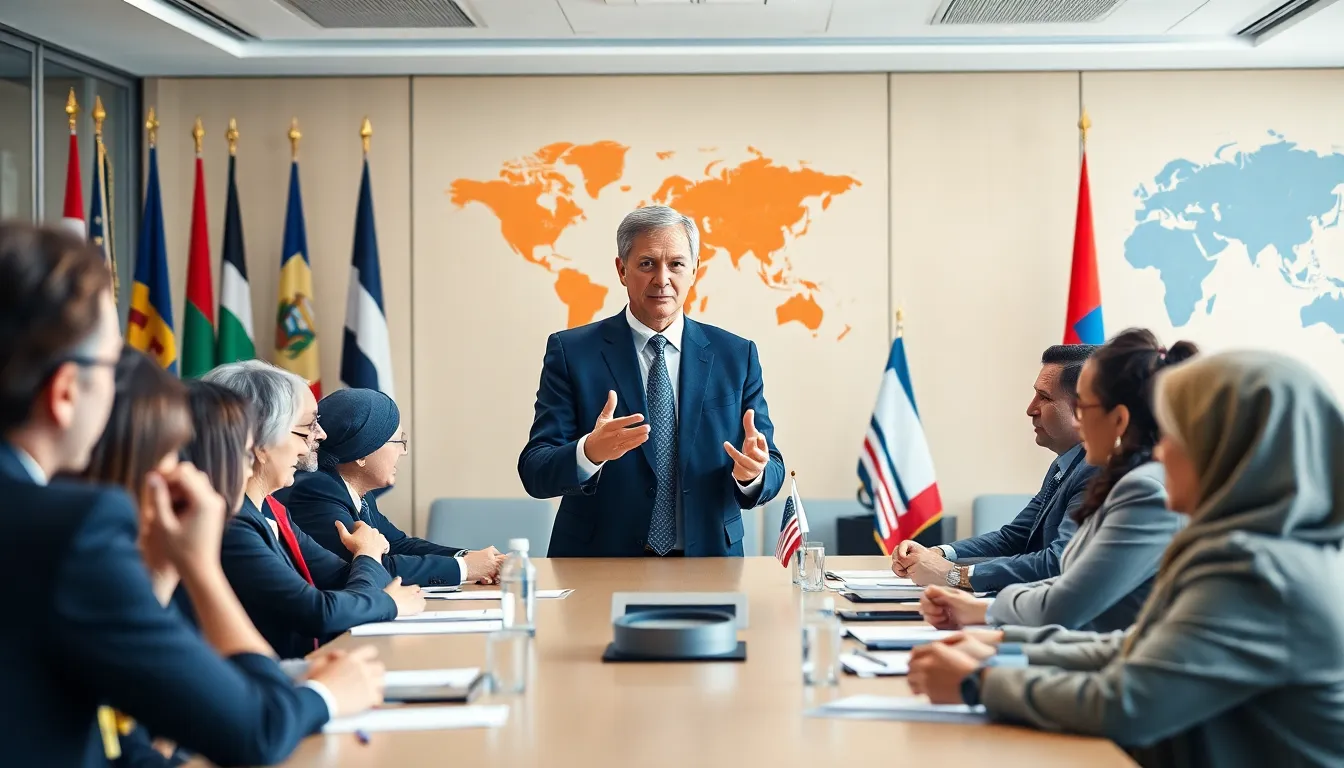In an increasingly interconnected world, understanding the nuances of diplomacy is more crucial than ever. Diplomatic insights offer a window into the complex interplay of international relations, revealing how nations navigate conflicts, forge alliances, and address global challenges. These insights not only shape policy decisions but also influence public perception and international cooperation.
As global dynamics shift, the role of diplomacy evolves, demanding a keen awareness of cultural, economic, and political contexts. By exploring key diplomatic strategies and trends, one can gain a deeper appreciation for the art of negotiation and the importance of effective communication in fostering peace and stability. This exploration of diplomatic insights aims to illuminate the pathways through which nations engage with one another, highlighting the significance of diplomacy in today’s world.
Table of Contents
ToggleOverview Of Diplomatic Insights
Diplomatic insights encompass the analysis and understanding of international relations, emphasizing conflict resolution, alliance formation, and management of global issues. These insights reveal the intricacies of diplomacy and shed light on how nations interact, negotiate, and collaborate.
- Conflict Resolution: Conflict resolution strategies enable nations to manage disputes effectively. Mediation, negotiation, and dialogue play crucial roles in preventing conflicts from escalating. Successful examples include the Camp David Accords and the Good Friday Agreement.
- Alliance Formation: Alliances strengthen diplomatic ties between countries. These partnerships often derive from shared interests or mutual security concerns. Notable alliances include NATO (North Atlantic Treaty Organization) and the European Union.
- Cultural Context: Cultural awareness enhances diplomatic engagement. Understanding cultural nuances fosters respectful communication and improves relationship-building among nations. Diplomatic training programs emphasize cultural sensitivity to navigate complex interactions.
- Economic Factors: Economic diplomacy focuses on trade relations, investment opportunities, and financial cooperation. Countries use economic tools to support foreign policy objectives. Trade agreements, such as NAFTA and the USMCA, exemplify economic diplomacy.
- Political Dynamics: Political analysis is vital in understanding the motivations and interests of nations. Domestic politics can significantly influence foreign policy decisions. Evaluating political landscapes aids diplomats in predicting responses to international events.
- Emerging Trends: The evolving landscape of diplomacy involves digital diplomacy and environmental considerations. Social media platforms influence public diplomacy, while climate change negotiations exemplify the growing importance of global environmental cooperation.
These insights underscore the significance of negotiation and effective communication as essential tools for fostering peace and stability among nations. Understanding these aspects provides a comprehensive view of contemporary diplomacy, contributing to informed and impactful international relations.
Importance Of Diplomatic Insights

Diplomatic insights play a crucial role in understanding and navigating the complexities of international relations. They provide the foundation for effective communication, conflict resolution, and collaboration among nations.
Role In International Relations
Diplomatic insights shape the dynamics between countries by facilitating dialogue and cooperation. They enable nations to address conflicts through mediation and negotiation, enhancing stability. Examples include the Camp David Accords, which resolved tensions between Israel and Egypt, and the Good Friday Agreement, which helped bring peace to Northern Ireland. Furthermore, diplomatic insights inform the formation of alliances, such as NATO and the European Union, reinforcing collaborative efforts and shared interests among member states.
Impact On Global Policies
Diplomatic insights significantly influence global policies on various issues, including trade, security, and climate change. Economic diplomacy plays a vital role in fostering trade agreements, illustrated by NAFTA and the USMCA, ensuring mutual benefits for participating nations. In security matters, diplomatic engagements help establish pacts that address threats and enhance stability. Moreover, as climate change becomes a pressing global challenge, diplomatic efforts focus on negotiations and agreements aimed at environmental protection, exemplified by the Paris Agreement. Effective diplomatic insights thus guide the formulation and implementation of policies that address pressing global issues, paving the way for collaborative solutions.
Key Theories And Principles
Understanding key theories and principles provides a foundation for analyzing diplomatic strategies. Two primary theories dominate the discourse: realism and liberalism, each offering unique perspectives on international relations.
Realism And Its Implications
Realism centers on the concept that states act primarily in their own self-interest within an anarchic international system. It emphasizes power dynamics, national security, and military capability as dominant forces in diplomacy. Realist thinkers, like Hans Morgenthau, argue that human nature drives conflicts, shaping relations among nations.
Realist principles include:
- State Sovereignty: Nations prioritize maintaining their independence and autonomy, often leading to competition and conflict.
- Power Politics: States pursue power through military strength and strategic alliances to ensure survival.
- Anarchy: The absence of a central authority forces states to rely on their capabilities, fostering a security dilemma where one state’s security measures threaten another.
Realism has significant implications for diplomatic relations. It encourages a focus on pragmatic solutions and power balance, prioritizing stability over idealistic goals. Successful negotiations often reflect these realist principles, aiming for outcomes that enhance national interests and security.
Liberalism In Diplomacy
Liberalism promotes the idea that cooperation among states fosters peace and stability. It recognizes the importance of international institutions, diplomacy, and trade in mitigating conflicts. Liberal theorists, such as Robert Keohane, emphasize interdependence and collective action as essential components of a stable international order.
Liberal principles include:
- International Cooperation: States benefit from working together to address global challenges, demonstrating that collaboration yields positive outcomes.
- Institutional Frameworks: Organizations like the United Nations and World Trade Organization facilitate dialogue, promote norms, and empower states to resolve disputes peacefully.
- Democratic Peace Theory: Democracies are less likely to engage in war with each other, suggesting that spreading democratic values contributes to global stability.
Liberalism influences diplomatic practices by encouraging multilateralism and fostering dialogues aimed at achieving common objectives. Prominent examples of liberal diplomacy include arms control agreements and climate accords, where collaborative efforts address shared global concerns.
Current Trends In Diplomatic Insights
Diplomatic insights evolve continuously, reflecting changes in technology and global power structures. These trends shape how nations engage with one another and address world challenges.
Technology’s Influence
Technology profoundly impacts diplomacy, with digital tools reshaping communication and information dissemination. Social media platforms allow governments and non-state actors to engage directly with populations, creating opportunities for real-time response and public diplomacy. For example, the use of Twitter by foreign ministers facilitates immediate updates and informal communications. Cyber diplomacy also emerges as a critical area, where nations collaborate on cybersecurity challenges and set protocols for digital conduct. Moreover, artificial intelligence and data analytics assist diplomats in assessing public sentiment and crafting tailored diplomatic strategies. These advancements enhance transparency and accessibility, making diplomatic processes more inclusive.
Shifts In Global Power Dynamics
Shifts in global power dynamics significantly influence diplomatic relations. With the rise of emerging economies such as India and Brazil, traditional power hierarchies are increasingly challenged. This multipolarity fosters new alliances and strengthens collective bargaining on issues like trade and climate change. For instance, BRICS (Brazil, Russia, India, China, South Africa) serves as an alternative forum for dialogue among these nations, promoting economic cooperation and development. Additionally, regional blocs like ASEAN enhance collaboration among Southeast Asian countries, adapting to dynamic geopolitical landscapes. These shifts highlight the necessity for diplomacy that accommodates various interests and addresses not only state actors but also non-state entities and international organizations.
Case Studies Of Effective Diplomacy
Camp David Accords
The Camp David Accords, signed in 1978, exemplify successful diplomacy. The United States, under President Jimmy Carter, facilitated negotiations between Israel and Egypt, resulting in a peace treaty. Both nations, motivated by the desire for stability and territorial security, engaged in intense discussions over twelve days. The accords led to Egypt’s recognition of Israel and Israel’s withdrawal from the Sinai Peninsula. This historic agreement demonstrates the effectiveness of third-party mediation in resolving protracted conflicts.
Good Friday Agreement
The Good Friday Agreement of 1998 marks a significant breakthrough in Northern Ireland’s peace process. The British and Irish governments, along with Northern Irish political parties, reached an accord emphasizing power-sharing and disarmament. Key provisions included the establishment of a devolved government and provisions for cross-border cooperation. The agreement illustrates how inclusive dialogue and political compromise can address deeply rooted sectarian conflicts, fostering long-term stability.
NATO’s Collective Defense
NATO, founded in 1949, showcases effective alliance formation in deterring aggression. The collective defense principle, embodied in Article 5, states that an attack on one member constitutes an attack on all. This framework proved efficient during the Cold War and continues to deter threats from non-member states. Instances like the response to the September 11 attacks in 2001 illustrate NATO’s ability to activate mutual defense commitments, reinforcing cooperative security among member nations.
European Union Integration
The European Union (EU) represents a successful model of economic and political integration. Established through treaties, the EU facilitates trade and diplomatic relations among its 27 member states. The Single Market allows for the free movement of goods, services, capital, and people, enhancing economic stability. The EU’s foreign policy aims to advance peace, democracy, and human rights globally, showcasing the power of multilateralism and collective action in contemporary diplomacy.
US-Mexico-Canada Agreement (USMCA)
The USMCA exemplifies modern economic diplomacy. This trade agreement, which replaced NAFTA in 2020, aims to strengthen North American economic ties. Key provisions include increased labor protections, environmental standards, and enhanced intellectual property rights. The USMCA illustrates the importance of negotiation and adaptation in evolving trade relationships, addressing contemporary challenges and fostering collaboration among three neighboring countries.
BRICS Cooperation
BRICS, comprising Brazil, Russia, India, China, and South Africa, represents a significant shift in global diplomacy. The group’s formation aims to promote cooperation among emerging economies, challenging traditional Western dominance. BRICS summits foster dialogue on economic development, trade, and security issues, highlighting the importance of multi-polar diplomacy. This coalition showcases how collaboration among diverse nations can address global challenges, from development to climate change.
These case studies illustrate the diverse strategies and principles that underpin effective diplomacy, showcasing how tailored approaches can address various global challenges and conflicts.
Challenges Faced By Diplomats
Diplomats encounter numerous challenges that affect their ability to maintain effective international relations and ensure stability.
Communication Barriers
Diplomats face communication barriers that complicate negotiations. Cultural differences can lead to misunderstandings and misinterpretations of messages. Language differences pose additional hurdles, as not every diplomat has fluency in multiple languages.
Political Pressures
Political pressures significantly impact diplomatic efforts. Domestic political climates can limit a diplomat’s flexibility in negotiations. Public opinion and electoral considerations often dictate the strategies diplomats adopt in sensitive discussions.
Security Threats
Security threats present obstacles to diplomatic missions. Diplomats operate in environments where violence or hostility may arise. High-profile diplomats frequently need protection, which can restrict their movements and engagement with local communities.
Ethical Dilemmas
Ethical dilemmas emerge regularly in diplomatic practice. Diplomats must balance national interests with moral obligations, leading to difficult decisions in conflict situations. These dilemmas can create tension between legal obligations and personal convictions.
Resource Limitations
Resource limitations hinder the effectiveness of diplomatic missions. Many diplomats operate with constrained budgets, affecting their ability to engage fully with foreign partners. Limited staffing can also reduce the depth of relationships diplomats can cultivate abroad.
Technological Changes
Technological changes constantly reshape the diplomatic landscape. Social media can amplify tensions and misrepresent diplomatic messages, complicating communication. Additionally, cyber threats challenge data security and the confidentiality of diplomatic correspondence.
Global Crises
Global crises significantly complicate diplomatic efforts. Natural disasters, pandemics, and economic instability often require immediate attention and coordination across borders. Diplomats must be prepared to navigate rapidly changing situations that test existing relationships.
Evolving International Norms
Evolving international norms influence diplomatic practices. Expectations around human rights, environmental policies, and trade can shift, compelling diplomats to adapt to new frameworks. Staying updated on these changes is essential for maintaining relevance in international discourse.
Understanding diplomatic insights is essential for navigating today’s complex international landscape. The interplay of cultural, economic, and political factors shapes how nations interact and resolve conflicts. As technology continues to evolve, so too does the practice of diplomacy, requiring adaptability and innovative strategies.
Emerging trends like digital diplomacy and the rise of multipolarity challenge traditional approaches and open new avenues for cooperation. By fostering effective communication and prioritizing negotiation, nations can work towards stability and peace. Ultimately, the insights gained from diplomatic practices equip individuals and policymakers to address global challenges more effectively, ensuring a collaborative approach in an interconnected world.



